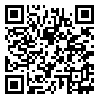Volume 22, Issue 3 (September 2024)
Iranian Rehabilitation Journal 2024, 22(3): 459-468 |
Back to browse issues page
Download citation:
BibTeX | RIS | EndNote | Medlars | ProCite | Reference Manager | RefWorks
Send citation to:



BibTeX | RIS | EndNote | Medlars | ProCite | Reference Manager | RefWorks
Send citation to:
Khan A, Affan Iqbal M, Ahmad U. Effects of Mulligan Mobilization and Transverse Friction Massage on Pain, Ranges and Functional Activities in Patients With Rotator Cuff Syndrome: A Randomized Clinical Trial. Iranian Rehabilitation Journal 2024; 22 (3) :459-468
URL: http://irj.uswr.ac.ir/article-1-2072-en.html
URL: http://irj.uswr.ac.ir/article-1-2072-en.html
1- Department of Physical Therapy, Capital Campus, NCS Institute of Sciences, Islamabad, Pakistan.
2- Department of Physical Therapy, Faculty of Rehabilitation and Allied Health Sciences, Riphah International University, Islamabad, Pakistan.
3- Department of Physical Therapy, Northwest Institute of Health Sciences, Peshawar, Pakistan.
2- Department of Physical Therapy, Faculty of Rehabilitation and Allied Health Sciences, Riphah International University, Islamabad, Pakistan.
3- Department of Physical Therapy, Northwest Institute of Health Sciences, Peshawar, Pakistan.
Abstract: (3330 Views)
Objectives: Rotator cuff syndrome (RCS) is a common upper extremity musculoskeletal condition in the working population, often leading to prolonged work absences. This study assesses and contrasts the impacts of Mulligan mobilization (MWM) and transverse friction massage in individuals with RCS.
Methods: A randomized clinical trial was conducted at Northwest General Hospital and Research Centre in Peshawar from January to June 2023. The trial involved 42 participants in the age range of 30 and 70 years who had grade I/II rotator cuff tear and pain. These participants were randomly divided into two groups. Group A was administered MWM, while group B received transverse friction massage in addition to standard care. Both groups received a six-week treatment and were evaluated at the beginning, third and sixth weeks using the visual analogue scale to measure pain, goniometry to assess shoulder range, and the disabilities of the arm, shoulder and hand (DASH) questionnaire to evaluate physical function.
Results: The between-group comparison showed a significant difference in VAS, shoulder ranges, and DASH scores in both groups in the third and sixth weeks (P<0.05). The pairwise comparisons within group A indicated a significant difference in VAS, shoulder ranges and DASH scores at baseline, the third week and the sixth week with P<0.05. Similarly, pairwise comparisons within group B showed a significant difference in VAS, shoulder ranges and DASH scores at the baseline, third week, and sixth week, with a value of P<0.05.
Discussion: The study concluded that MWM with movement and transverse friction massage can improve pain intensity, shoulder ranges, and physical function in people with grade (I) or grade (II) RSC.
Methods: A randomized clinical trial was conducted at Northwest General Hospital and Research Centre in Peshawar from January to June 2023. The trial involved 42 participants in the age range of 30 and 70 years who had grade I/II rotator cuff tear and pain. These participants were randomly divided into two groups. Group A was administered MWM, while group B received transverse friction massage in addition to standard care. Both groups received a six-week treatment and were evaluated at the beginning, third and sixth weeks using the visual analogue scale to measure pain, goniometry to assess shoulder range, and the disabilities of the arm, shoulder and hand (DASH) questionnaire to evaluate physical function.
Results: The between-group comparison showed a significant difference in VAS, shoulder ranges, and DASH scores in both groups in the third and sixth weeks (P<0.05). The pairwise comparisons within group A indicated a significant difference in VAS, shoulder ranges and DASH scores at baseline, the third week and the sixth week with P<0.05. Similarly, pairwise comparisons within group B showed a significant difference in VAS, shoulder ranges and DASH scores at the baseline, third week, and sixth week, with a value of P<0.05.
Discussion: The study concluded that MWM with movement and transverse friction massage can improve pain intensity, shoulder ranges, and physical function in people with grade (I) or grade (II) RSC.
Article type: Original Research Articles |
Subject:
Physiotherapy
Received: 2023/09/15 | Accepted: 2024/01/13 | Published: 2024/09/1
Received: 2023/09/15 | Accepted: 2024/01/13 | Published: 2024/09/1
Send email to the article author








